- Home
- André Aciman
Alibis
Alibis Read online
For Michael,
Hermosura
Contents
Title Page
Dedication
Lavender
Intimacy
My Monet Moment
Temporizing
Reflections of an Uncertain Jew
A Literary Pilgrim Progresses to the Past
The Contrafactual Traveler
Roman Hours
The Sea and Remembrance
Place des Vosges
In Tuscany
Barcelona
New York, Luminous
Self-Storage
The Buildings Themselves Have Died
Empty Rooms
Rue Delta
Afterword: Parallax
Also by André Aciman
Copyright
Lavender
I
Life begins somewhere with the scent of lavender. My father is standing in front of a mirror. He has just showered and shaved and is about to put on a suit. I watch him tighten the knot of his necktie, flip down his shirt collar, and button it up. Suddenly, there it is, as always: lavender.
I know where it comes from. An elaborately shaped bottle sits on the dresser. One day, when I’m having a very bad migraine and am lying on the living room sofa, my mother, scrambling for something to take my mind off the pain, picks up the bottle, unscrews the cap, and dabs some of its contents onto a handkerchief, which she then brings to my nose. Instantly, I feel better. She lets me keep the handkerchief. I like to hold it in my fist, with my head tilted slightly back, as if I’d been punched in a fistfight and were still bleeding—or the way I’d seen others do when they were feeling sick or crushed and walked about the house taking occasional sniffs through crumpled handkerchiefs in what looked like last-ditch efforts to avoid a fainting spell. I liked the handkerchief, liked the secret scent emanating from within its folds, liked smuggling it to school and taking furtive whiffs in class, because the scent brought me back to my parents, to their living room, and into a world that was so serene that just inhaling its scent cast a protective cloud around me. Smell lavender and I was sheltered, happy, beloved. Smell lavender and in came good thoughts—about life, about those I loved, about me. Smell lavender and, no matter how far from one another, we were all gathered in one warm, snug room stuffed with pillows, close to a crackling fire, with the patter of rain outside to remind us our lives were secure. Smell lavender and you couldn’t pull us apart.
My father’s old cologne can be found the world over. I have only to walk into a large department store and there it is. Half a century later it looks exactly the same. I could, if I were prescient enough and did not want to risk walking into a store one day and not finding it, purchase a tiny bottle and keep it somewhere, as a stand-in for my father, for my love of lavender, or for that fall evening when, as an adolescent, I’d gone with my mother to buy my first aftershave but couldn’t make up my mind and returned alone the next evening after school, happy to discover, among so many other things, that a man could use shaving as an excuse for wearing perfume.
I was baffled to find there were so many scents in the world, and even more baffled to find my father’s scent among them. I asked the salesman to let me sample my father’s brand, mispronouncing its name on purpose, overdoing my surprise as I examined its slanted shape as though it were a stranger whom I had hailed in error, knowing that the bottle and I were on intimate terms at home, that if it knew every twist my worst migraines took—as I knew every curve on its body—it knew of my imaginary flights from school in Mother’s handkerchief, knew more about my fantasies than I dared know myself. And yet, in the shop that was about to close that day and whose owner was growing ever more impatient with my inability to choose, I felt mesmerized by something new, something at once dangerous and enticing, as though these numberless bottles, neatly arranged in stacks around the store, held the promise of nights out in large cities where everything from the buildings, lights, faces, foods, places, and the bridges I’d end up crossing made the world ever more desirable, if only because I too, by virtue of this or that potion, had become desirable—to others, to myself.
I spent an hour testing bottles. In the end I bought a lavender cologne, but not my father’s. After paying and having the package gift wrapped, I felt as though I’d been handed a birth certificate or a new passport. This would be me—or me as long as the bottle lasted. Then we’d have to look into the matter again.
Over time, I discovered all kinds of lavenders. There were light, ethereal lavenders; some were mild and timid; others lush and overbearing; some tart, as if picked from the field and left to parch in large vats of vinegar; others were overwhelmingly sweet. Some lavenders ended up smelling like an herb garden; others, with hints of so many spices, were blended beyond recognition.
I experimented with each one, purchased many bottles, not just because I wanted to collect them all or was searching for the ideal lavender—the hidden lavender, the ur-lavender that superseded all other lavenders—but because I was eager to either prove or disprove something I suspected all along: that the lavender I wanted was none other than the one I’d grown up with and would ultimately turn back to once I’d established that all the others were wrong for me. Perhaps the lavender I wanted was basic lavender. Ordinary lavender. Papa’s lavender. You go out into the world to acquire all manner of habits and learn all sorts of languages, but the one tongue you neglect most is the one you’ve spoken at home, just as the customs you feel most comfortable with are those you never knew were customs until you saw others practice completely different ones and realized you didn’t quite mind your own, though you’d strayed so far now that you probably no longer knew how to practice them. I collected every fragrance in the world. But my scent—what was my scent? Had I ever had a scent? Was there going to be one scent only, or would I want all of them?
What I found after purchasing several aftershaves was that they would all lose their luster, like certain elements in the actinide series that have a brief radioactive life before turning into lead. Some smelled too strong, or too weak, or too much of such and such and not enough of this or that. Some failed to bring out something essential about me; others suggested things that weren’t in me at all. Perhaps finding fault with each fragrance was also my way of finding fault with myself, not just for choosing the wrong fragrance each time, or for even thinking I needed a fragrance in the first place, but for believing that the blessings conferred by cologne could ever bring about the new life I yearned for.
And yet, even as I criticized each fragrance, I found myself growing attached to it, as though something that had less to do with the fragrances themselves than with that part of me that had sought them out and been seduced by them and finally blossomed because of them should never be allowed to perish. Sometimes the history of provisional attachments means more to us than the attachments themselves, the way the history of a love affair stirs more love than the affair itself. Sometimes it is in blind ritual and not faith that we encounter the sacred, the way it is habit not character that makes us who we are. Sometimes the clothes and scents we wear have more of us in them than we do ourselves.
The search for ideal lavender was like the search for that part of me that needed nothing more than a fragrance to emerge from the sleep of thousands. I searched for it the way I searched for my personal color, or for a brand of cigarettes, or for my favorite composer. Finding the right lavender would finally allow me to say, “Yes, this is me. Where was I all this time?” Yet, no sooner is the scent purchased, than the me who was supposed to emerge—like the us who is about to emerge when we buy new clothes, or sign up for a magazine that seems so thoroughly right for us, or purchase a membership to a health club, or move to a new city, or discover a new faith and practice new rituals with
new congregants among whom we make new friends—this me turns out to be, of course, the one we’d always wished to mask or drive away. What did I expect? Different scent, same person.
Over the past thirty-five years I have tried almost all the colognes and aftershaves that perfume manufacturers have concocted. Not just lavenders, but pine, chamomile, tea, citrus, honeysuckle, fern, rosemary, and smoky variations of the most rarefied leathers and spices. I liked nothing more than to clutter my medicine cabinet and the entire rim of my bathtub with bottles two and three deep, each vial like a tiny, unhatched effigy of someone I was, or wished to be, and, for a while, thought I’d finally become. Scent A: purchased in such and such a year, hoping to encounter happiness. Scent B: purchased while scent A was almost finished; it helped me abandon A. C, marking sudden fatigue with B. D was a gift. Never liked it; wore it to make the giver happy; stopped using it as soon as she was gone. Comes E, which I loved so much that I eventually purchased F, along with nine of its sibling scents made by the same house. Yet F managed to make me tire of E and its isotopes. Sought out G. Disliked it as soon as I realized that someone I hated loved it. Then H. How I loved H! Stayed with H for years. They don’t make it any longer; should have stocked up on it. But then, much as I loved it, I had stopped using it long before its manufacturer discontinued it. Back to E, which I had always liked. Yes, definitely E. Until I realized there had always been something slightly off, something missing about E. I stopped using it again. Of the woman who breezed through my life and, in the ten days I knew her, altered me forever, all I remember is her gift. I continued to wear the fragrance she’d given me as a way of thinking she’d be back soon enough. Now, twenty years later, all that’s left of her is a bottle that reminds me less of her than of the lover I once was.
I have thrown many things away in life. But aftershave bottles, never. I take these bottles wherever I move, the way the ancients traveled with their ancestral masks. Each bottle contains a part of me, the formaldehyded me, the genie of myself. One could, as in an Arabian tale, rub each bottle and summon up an earlier me. Some, despite the years, are still alive, though not a thing they own or wear is any longer in my possession; others have even died or grown so dull I want nothing more to do with them; I’ve forgotten their phone number, their favorite song, their furtive wishes. I take up an old scent and, suddenly, I remember why this scent always reminds me of the most ardent days of my life—ardent not because they had been happy times, but because I had spent so much time thirsting for happiness that, in retrospect, some of that imagined happiness must have rubbed off and scented an entire winter, casting a happy film over days I’ve always known I’d never wish to relive. And as I hold this bottle, which seems more precious than so many things, I begin to think that one day someone I love—particularly someone I love—will happen along and open it and wonder what this scent could possibly have meant to me. What was it I’d wished to keep alive all these years? This is the scent of early spring when they called to say things had gone my way. This of an evening with my mother, when she came to meet me downtown and I thought how old she looks—now I realize she was younger by ten years than I am today. This the night of the A-minor. “And this?” they’ll want to ask. “How about this one?”
Fragrances linger for decades, and our loved ones may remember us by them, but the legend in each vial clams up the moment we’re gone. Our genie speaks to no one. He simply watches as those he’s loved open and investigate. He’s dying to scream with the agony of ten Rosetta stones begging to be heard across the centuries. “This was the day I discovered pleasure. And this—how couldn’t any of you know?—this was the night we met, standing outside Carnegie Hall after a concert, and how simply one thing led to another, and afterward, when it rained, we had waited awhile under the cantilever, both reluctant to leave, having found a pretext in rain, strangers starting to talk, making a quick dash into a nearby coffee shop—deplorable coffee, damp shoes, wet hair, surly foreign waiter mumbling Unspeakanese when we tipped him kindly—and sat and spoke of Mahler and The Four Quartets, and no one would have guessed, not even us, we’d end up together in a studio on the Upper West Side.” But the voice cannot be heard. To die is to forget you ever lived. To die is to forget you loved, or suffered, or got and lost things you wanted. Tomorrow, you say to yourself, I won’t remember anything, won’t remember this face, this knee, this old scar, or the hand that wrote all this.
The bottles are stand-ins for me. I keep them the way the ancient Egyptians kept all of their household belongings: for that day when they’d need them in their afterlife. To part with them now is to die before my time. And yet, there are times when I think there should have been many, many other bottles there—not just bottles I lost or forgot about, but bottles I never owned, bottles I didn’t even know existed and, but for a tiny accident, might have given an entirely different scent to my life. There is a street I pass by every day, never once suspecting that in years to come it will lead to an apartment I still don’t know will be mine one day. How can I not know this—isn’t there a science?
Conversely, there are places I bid farewell to long before knowing I must leave, places and people whose disappearance I rehearse not just to learn how to live without them when the time comes but to put off their loss by foreseeing it a bit at a time beforehand. I live in the dark so as not to be blinded when darkness comes. I do the same with life, making it more conditional and provisional than it already is, so as to forget that one day my birthday will come around and I won’t be there to celebrate it.
It is still unthinkable that those who caused us the greatest pain and turned us inside out could at some point in time have been totally unknown, unborn to us. We might have crossed them in numberless places, given them street directions, opened a door for them, stood up to let them take their seat in a crowded concert hall, and never once recognized the person who would ruin us for everyone else. I’d be willing to shave years from the end of my life to go back and intercept that evening under a cantilever when we both put our coats over our heads and rushed through the rain after coffee and I said, almost without thinking, I didn’t want to say good night yet, although it was already dawn. I would give years, not to unwrite this evening or to rewrite it, but to put it on hold and, as happens when we bracket off time, be able to wonder indefinitely who I’d be had things taken another turn. Time, as always, is given in the wrong tense.
* * *
The walls of the Farmaceutica of Santa Maria Novella in Florence are lined with rows of tiny drawers, each of which contains a different perfume. Here I could create my own scent museum, my own laboratory, my imaginary Grasse, the perfume capital of France, with all its quaint ateliers and narrow lanes and winding passageways linking one establishment to the next. My scent museum would boast even its own periodic table, listing all the perfumes in my life, beginning, of course, with the first, the simplest, the lightest—lavender, the hydrogen of all fragrances—followed by the second, the third, the fourth, each standing next to the other like milestones in my life, as though there were indeed a method to the passage of time. In the place of helium (He, atomic number 2) I’d have Hermès, and in the place of lithium (Li, 3) Liberty; Bernini would replace beryllium (Be, 4), Borsari boron (B, 5), Carven carbon (C, 6), Night nitrogen (N, 7), Onyx oxygen (O, 8), and Floris fluorine (F, 9). And before I know it my entire life could be charted by these elements alone: Arden instead of argon (Ar, 18), Knize instead of potassium (K, 19), Canoe for calcium (Ca, 20), Guerlain for germanium (Ge, 32), Yves Saint Laurent for yttrium (Y, 39), Patou for platinum (Pt, 78), and, of course, Old Spice for osmium (Os, 76).
As in Mendeleyev’s periodic table, one could sort these scents in rows and categories: by herbs, flowers, fruits, spices, woods. Or by places. By people. By loves. By the hotels where this or that soap managed to cast an unforgettable scent over this or that great city. By the films or foods or clothes or concerts we’ve loved. By perfumes women wore. Or even by years, so that I could ma
rk the bottles as my grandmother would when she labeled each jar of marmalade with her neat octogenarian’s cursive, noting on each the fruit and the year of its make—as though each scent had its own Werke-Verzeichnis number. Aria di Parma (1970), Acqua Amara (1975), Ponte Vecchio (1980).
The aftershaves I used at 18 and at 24, different fragrances, yet located on the same column: a voyage to Italy is what they shared. Me at 16 and me at 32: twice the age, yet still nervous when calling a woman for the first time; at 40 I couldn’t solve the calculus problems I didn’t understand at 20; after rereading and teaching Wuthering Heights so many times, the scenes I remembered best at 48 were those retained from my very first reading at 12, four “generations” earlier. Me at 14, 18, 22, 26—life retold in units of four. Me at 21, 26, 31, 36, of fives. The folio method, the quarto method, the octavo—in halves, in fourths, by eighths. Life arranged in Fibonacci’s sequence: 8, 13, 21, 34, 55, 89. Or in Pascal’s: 4, 10, 20, 35, 56. Or by primes: 7, 11, 13, 17, 19, 23, 29, 31. Or in combinations of all three: I was handsome at 21, why did I think I wasn’t; I had so much going for me at 34, why then was I longing to be who I’d been at 17? At 17, I couldn’t wait to be 23. At 23, I longed to meet the girls I’d known at 17. At 51, I’d have given anything to be 35, and at 41 was ready to dare things I was unprepared for at 23. At 20, 30 seemed the ideal age. At 80, will I manage to think I’m half my age? Will there be summer in the snow?
Time’s covenants are all warped. We live Fibonacci lives: three steps forward, two steps back, or the other way around: three steps forward, five back. Or in both directions simultaneously, in the manner of spiders or of Bach’s crab canons, spinning combinations of scents and elective affinities in what turns out to be an endless succession of esters and fragrances that start from the simplest and fan out to the most complex: one carbon, two carbons, three carbons; six hydrogens, eight hydrogens, ten … C3H6O2, ethyl formate; C4H8O2, ethyl acetate; C5H10O2, ethyl propionate; C5H10O2, methyl butanoate (which has an apple aroma); C5H10O2, propyl ethanoate (pear aroma); C6H12O2, ethyl butyrate; C7H14O2, ethyl valerate (banana); C8H9NO2, methyl anthranilate (grape); C9H10O2, benzylyl ethanoate (peach); C10H12O2, ethyl phenyl ethanoate (honey); C10H20O2, octyl ethanoate (orange-apricot); C11H24O2, ethyl decanoate (cognac); C9H6O2, coumarin (lavender). Say lavender and you have a scent, a chain, a lifetime.

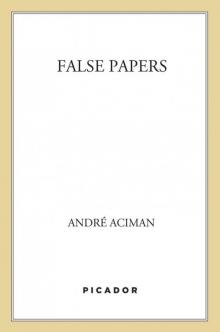 False Papers
False Papers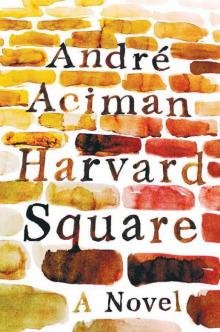 Harvard Square
Harvard Square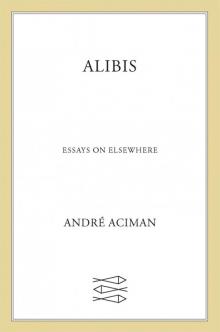 Alibis
Alibis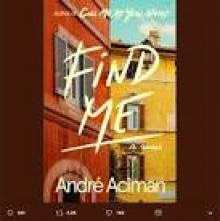 Find Me
Find Me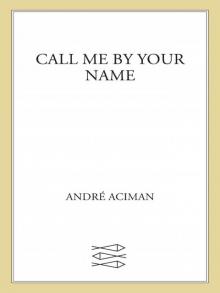 Call Me by Your Name
Call Me by Your Name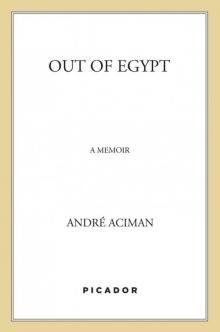 Out of Egypt: A Memoir
Out of Egypt: A Memoir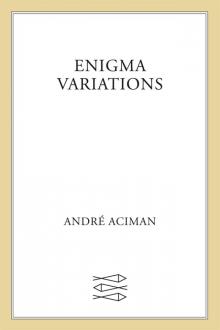 Enigma Variations
Enigma Variations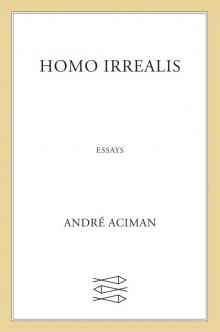 Homo Irrealis
Homo Irrealis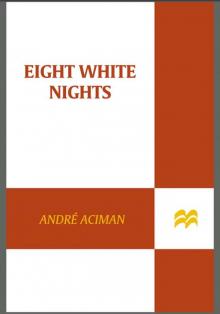 Eight White Nights
Eight White Nights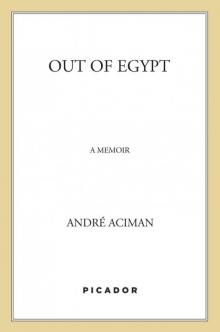 Out of Egypt
Out of Egypt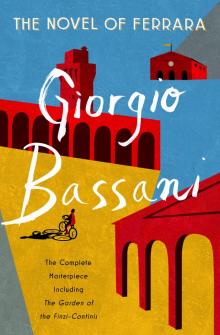 The Novel of Ferrara
The Novel of Ferrara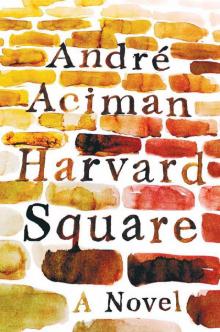 Harvard Square: A Novel
Harvard Square: A Novel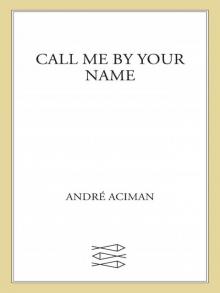 Call Me by Your Name: A Novel
Call Me by Your Name: A Novel